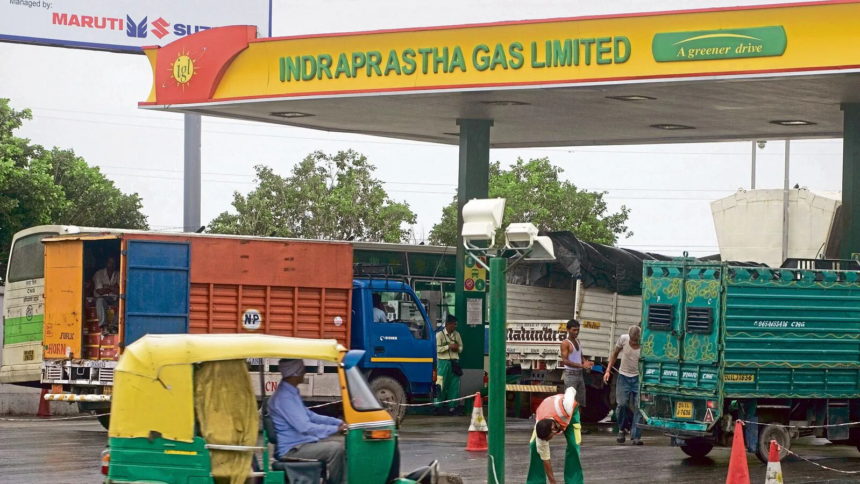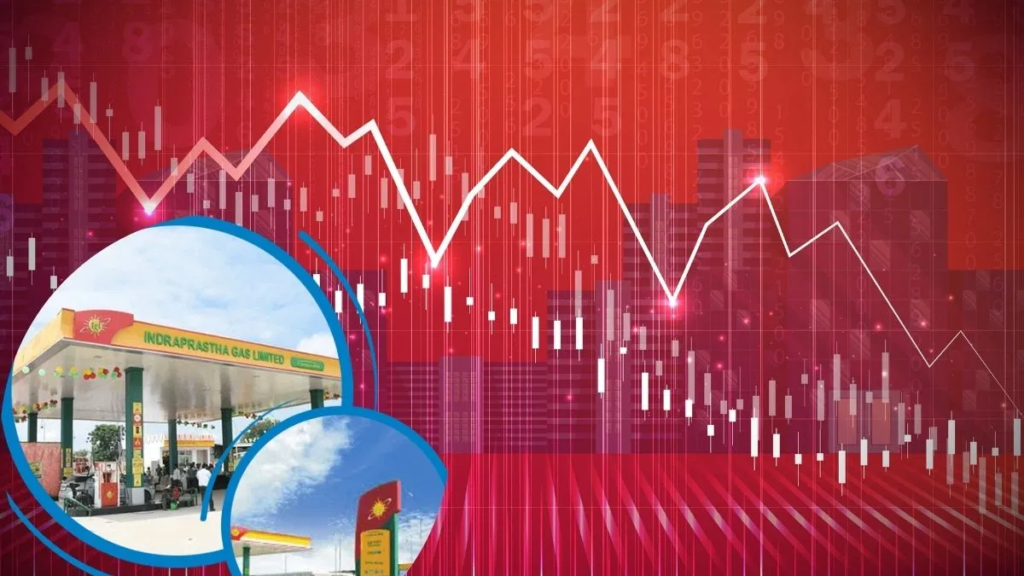The Immediate Impact: Slumping Stock Prices
On Monday, the stock of Indraprastha Gas (IGL) plummeted by a staggering 20%, closing the session at Rs 324.40. It was a painful sight for investors as the stock dipped to a new 52-week low of Rs 323.10. Similarly, shares of Mahanagar Gas (MGL) didn’t fare much better. They fell 18% to an intra-day low of Rs 1,075.25, only to close the day 13.85% down at Rs 1,130.80.
The declines aren’t limited to these two companies. Adani Total Gas saw its share price drop 4.6%, closing at Rs 652.15, while GAIL’s stock fell 2.1%, ending the day at Rs 184.89.
What’s Behind the Slump?
The core reason behind the sudden dip in IGL share price and others lies in the government’s decision to cut gas allocations. This decision affects the price at which gas distributors can procure gas,
which ultimately impacts their margins. CGD companies, including Indraprastha Gas (IGL) and Mahanagar Gas,
rely heavily on the APM gas for their operations. With a reduction in this allocation, the cost of procurement increases, squeezing profits and making the companies less attractive to investors.
How the Cuts Affect Financials: A Deep Dive
Brokerages are starting to adjust their forecasts for these companies, and the outlook is far from rosy. InCred Equities, for example, has estimated that IGL and MGL could face a significant decline in their earnings before interest, tax, depreciation, and amortization (EBITDA). The impact could be as much as 46% for IGL and 25% for MGL on a per standard cubic meter (scm) basis.
In light of this, IGL’s EBITDA guidance for Q2 has already lower to Rs 3.5/scm,
from previous estimates of Rs 6-7/scm. The same trend is seen for MGL, where earnings estimates have been revised downwards. Due to these adjustments,
analysts are downgrading their target prices for IGL share price and MGL shares by a substantial margin.
Analyst Reactions: Downgrades and Target Price Cuts
The repercussions are being felt across the financial spectrum. Brokerages like JM Financial Services have slashed their EBITDA estimates for IGL and MGL by up to 14% for the period FY25-27. The firm has also reduce its target prices—IGL’s target has lower to Rs 350,
and MGL’s target price has been adjust down to Rs 1,100. Both stocks are now rated ‘Sell’ by JM Financial Services.
Even Gujarat Gas, another key player in the market, is feeling the pressure. Although the company has a more favorable position due to its higher exposure to the industrial segment, its target price has been cut to Rs 600. Still, analysts maintain a ‘Buy’ rating for Gujarat Gas,
anticipating better pricing power in the industrial sector over the long term.
The Bigger Picture: Global LNG Market Trends
While domestic supply constraints are playing a role, there’s a broader picture here. The global liquefied natural gas (LNG) market is undergoing changes that could impact the cost dynamics for these companies. As global LNG supply capacity increases, spot LNG prices could see moderation in the coming months,
providing some relief to gas distributors in the medium to long term. For companies like Gujarat Gas, this could mean improved pricing power and margins.
What Does This Mean for Investors?
For investors watching the gas distribution sector, this could be a volatile period. The near-term outlook is grim, as IGL share price and others like MGL are under pressure due to the reduced gas allocations. But there’s a glimmer of hope for the future, especially if global LNG prices moderate. If you’re a long-term investor,
it might be worth holding onto stocks like Gujarat Gas, which has a more diversified portfolio.
However, short-term investors may want to rethink their positions. If the price hikes that market analysts are expecting don’t materialize, these stocks could continue to face downward pressure. The next few months will be critical in determining whether these companies can weather the storm.
Impact on Gujarat Gas: A Slightly Better Outlook
Unlike IGL and MGL, Gujarat Gas has a stronger position due to its industrial customer base. The company derives around 60% of its volume from the industrial sector,
which is less sensitive to changes in domestic gas pricing. In addition, with global LNG supply set to increase,
there could be a reduction in spot LNG prices, which may work in Gujarat Gas’s favor.
Despite the price cuts, analysts like JM Financial are still optimistic about Gujarat Gas, albeit with a reduced target price of Rs 600. The company is expect to benefit from improve pricing power in the long term, especially as global LNG prices stabilize.
What Investors Should Watch For Moving Forward
As the situation unfolds, it’s important for investors to keep a close eye on the following:
- Government Policy Changes: Any further cuts to APM gas allocation could have an even bigger impact on CGD companies.
- Global LNG Price Movements: The direction of global LNG prices will be crucial for companies like Gujarat Gas.
- Company Earnings: Watch for quarterly results that could reflect the full impact of these gas allocation cuts.
- Price Hikes: Whether companies will be able to pass on increased costs to consumers will be a key factor in determining their ability to maintain margins.
Read More: BSEB STET Result 2024: Easy Steps to Download and Latest Updates
Conclusion
The recent drop in IGL share price and others is a clear sign of the stress that the city gas distribution sector is under. While the immediate outlook is uncertain,
the situation may improve over time if global LNG prices come down and government policies shift in favor of these companies. For now,
investors need to stay inform and prepare for some turbulence in the gas distribution stocks. The future could hold potential, but it will take some time for the market to stabilize.










